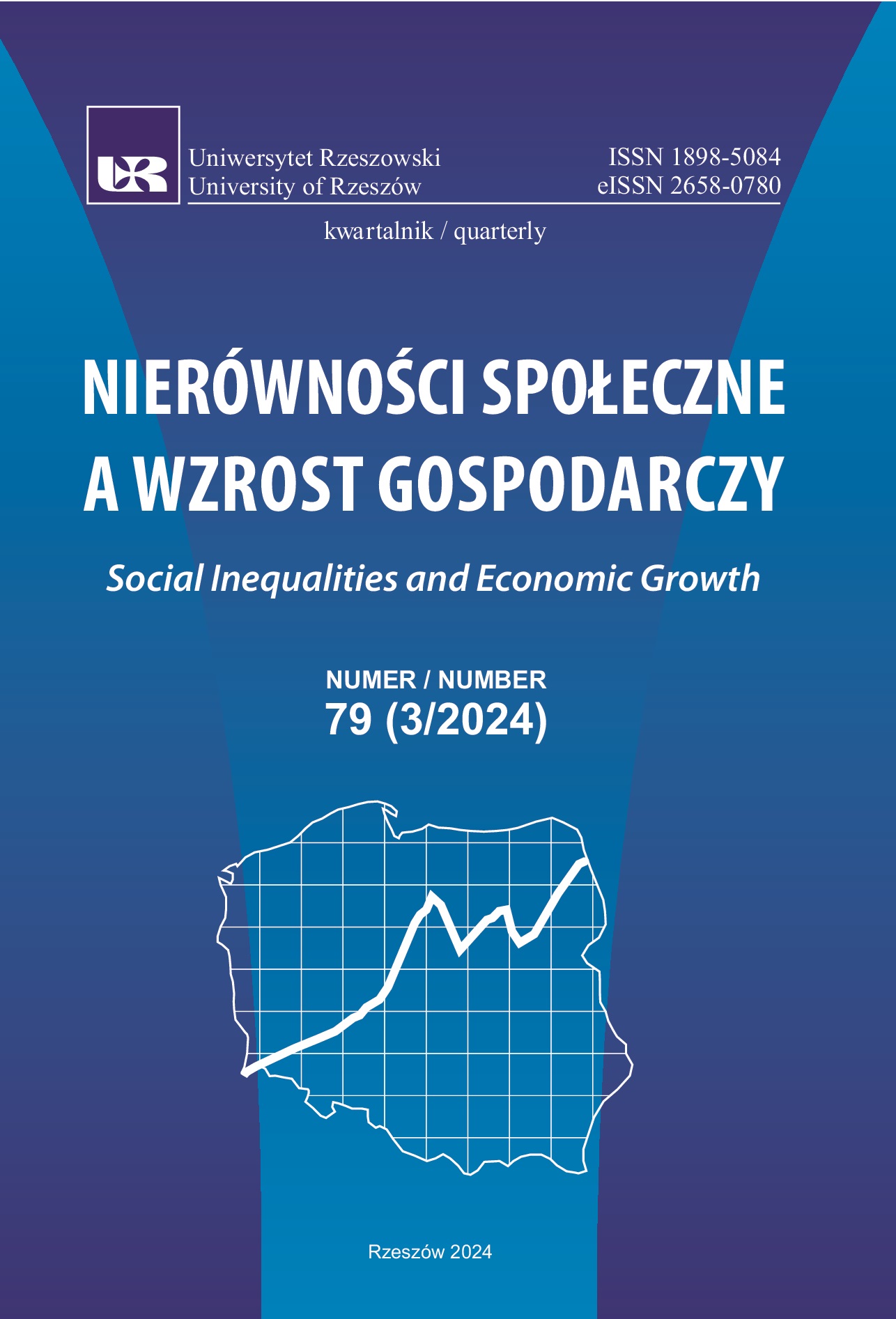Antonimy moralne Ericha Fromma
DOI:
https://doi.org/10.15584/nsawg.2024.3.1Słowa kluczowe:
biofilia-nekrofilia, produktywność-alienacja, mieć-być, syndrom wzrostu-zanik, religia humanistyczna-autorytarnaAbstrakt
Erich Fromm interpretując rzeczywistość, posługiwał się słowami nowatorskimi, a jednocześnie całkowicie przeciwstawnymi, to znaczy nadającymi wybranemu terminowi przeciwne znaczenie. Do antonimów moralnych zaliczają się takie kombinacje, jak religia autorytarno-humanistyczna, sumienie autorytarno-humanistyczne, kapłani-prorocy, człowiek-wilk-owca, autorytarno-heteronimiczne posłuszeństwo, bałwochwalstwo-wiara, sposób bycia, potrzeby-pragnienia, potrzeby destrukcyjno-konstruktywne, alienacja-produktywność, zespół gnicia i wzrostu, nekrofilia-biofilia. Używając terminów, które same w sobie stanowią semantyczną przeciwwagę, Fromm opisał sytuację moralną człowieka i społeczeństwa.
Downloads
Bibliografia
Alexander, J.C. (2021). The prescience and paradox of Erich Fromm: A note on the performative contradictions of critical theory. Thesis Eleven, 165(1), 3–9. DOI: 10.1177/07255136211032830.
Carlisle, C. (ed.). (2020). Spinoza’s Ethics. New Jersey: Princeton University Press.
Cortina, M. (2015). The Greatness and Limitations of Erich Fromm’s Humanism. Contemporary Psychoanalysis, 51(3), 388–422. DOI: 10.1080/00107530.2015.999297.
Durkin, K. (2014). The Radical Humanism of Erich Fromm. New York: Palgrave Macmillan.
Eckhart, M. (2009). The Complete Mystical Works of Meister Eckhard. New York: The Crossroad Publishing Company.
Frankena, W.K. (1977). Spinoza on the knowledge of good and evil. Philosophia, 7, 15– 44. DOI: 10.1007/BF02379990.
Fromm, E. (1962). Beyond the Chains of Illusion: My Encounter with Marx and Freud. New York: Simon & Schuster, Inc.
Fromm, E. (1949). Man for Himself. An Enquiry into the Psychology of Ethics. London: Routledge & Kegan Paul Ltd.
Fromm, E. (2010). On disobedience. Why Freedom Means Saying “No” to Power. New York: HarperCollins Publishers.
Fromm, E. (1950). Psychoanalysis and Religion. New York: Yale University Press.
Fromm, E. (1973). The Anatomy of Human Destructiveness. New York: Henry Holt and Company.
Fromm, E. (2009). The Art of Loving. New York-London: Continuum.
Fromm, E. (1991). The Crisis of Psychoanalysis. Essays on Freud, Marx and Social Psychology. New York: Henry Holt & Company.
Fromm, E. (1942). The Fear of Freedom. London: Routledge and Kegan.
Fromm, E. (1964). The Heart of Man: Its Genius for Good and Evil. New York: Harper & Row.
Fromm, E. (1956). The Sane Society. London: Routledge & Kegan Paul.
Fromm, E. (2008). To Have or to Be? London-New York: Continuum.
Fuchs, Ch. (2020). Erich Fromm and the Critical Theory of Communication. Sage Journals, 44, 298–325. DOI: 10.1177/0160597620930157.
Funk, R. (1988). Erich Fromm’s concept of social character. Social Thought and Research, 20(1&2), 215–229. DOI: 10.17161/STR.1808.5133.
Hobbes, T. (2016). Levithan. New York: Routledge.
Itzkowitz, S. (2017). Erich Fromm: A Psychoanalyst for All Seasons. Psychoanalytic Perspectives, 1, 81–92. DOI: 10.1080/1551806X.2016.1209351.
Kietliński, K. (2007). Etyczne wybory w konsumpcji. Collectanea Theologica, 2, 69–82.
Lidz, V. (1982). Religion and Cybernetic Concepts in the Theory of Action. Sociology of Religion, 43(4), 287–305. DOI: 10.2307/3710829.
Marx, K. (2007). The Contribution to the Critique of Political Economy. Whitefish: Kessinger Publishing LLC.
Schimmel, N. (2009). Judaism and the Origins of Erich Fromm’s Humanistic Psychology. The Religious Reverence of a Heretic. Journal of Humanistic Psychology, 49(1), 9–45. DOI: 10.1177/0022167808319724.
Wilde, L. (2007). The Ehical Challenge of Touraine’s Living Together. The Journal of Global Ethics, 3(1), 39–53. DOI: 10.1080/17449620600991564.
Pobrania
Opublikowane
Jak cytować
Numer
Dział
Licencja
Prawa autorskie (c) 2024 Uniwersytet Rzeszowski

Utwór dostępny jest na licencji Creative Commons Uznanie autorstwa – Użycie niekomercyjne – Bez utworów zależnych 4.0 Międzynarodowe.


